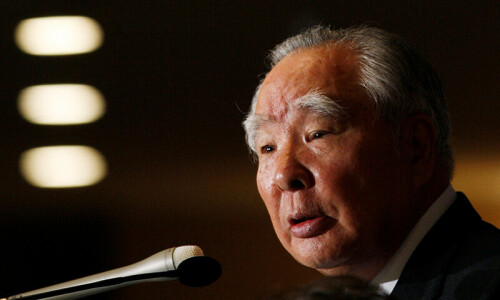THE coronavirus pandemic is anti-feminist. This seems a strange statement given that evidence suggests that men are worse affected by Covid-19. But in terms of broader social and economic considerations, the pandemic globally is expected to set women back decades. Pakistan’s deeply entrenched misogyny means we’re unlikely to do enough, if anything at all, to stop this backward slide.
The pandemic affects women at multiple levels, starting with significant health impacts. Health workers — 70 per cent of whom worldwide are women — are among the most vulnerable to being infected by Covid-19. But the health toll for women extends beyond the coronavirus itself. Previous health crises, such as the Ebola epidemic, have shown that resources are typically diverted to lifesaving health measures from women’s health and reproductive services. The UN has already highlighted that Covid-19 will disrupt its programmes providing family planning support and countering female genital mutilation and child marriage, resulting in millions of unwanted pregnancies, higher maternal mortality rates for years to come, and millions more girls being cut.
The Covid-19 crisis has also put the spotlight on the frequency and intensity of domestic violence around the world — the UN Population Fund in April estimated a 20pc increase in violence during a three-month lockdown period. One can only imagine how much higher this figure would be if accounting for permissive societal attitudes towards domestic violence in countries like Pakistan.
The immediate effect of the virus on women will be in terms of workforce participation. Societal expectations globally means women will be likelier to give up or be fired from jobs as they take on additional caring responsibilities for out-of-school children, the elderly and sick along with mounting housework. Sadly, in patriarchal societies such as ours, this trend will not even be perceived as problematic.
There are sad reminders of how deeply rooted misogyny is.
It doesn’t help that women’s current positioning within the global economy will force them to opt out faster than men. The ILO reports that globally women represent 40pc of total employment, but make up 57pc of the cadre of part-time workers; 69pc of low earners are women. In South Asia, over 80pc of women who don’t work in agriculture are in informal employment, including domestic work and piece-rate manufacturing jobs. These are the workers most likely to lose their jobs and fail to qualify for government job protection schemes.
Women in formal employment also dominate in sectors worst-hit by the pandemic: air travel, tourism, retail, hospitality, catering. Citigroup last month estimated that globally, 220 million women are in sectors vulnerable to massive job cuts.
This does not mean that women’s economic contribution is expendable. Citigroup has also estimated $1 trillion could be lost from global growth as a result of women falling out of the workforce. The cost will be palpable in places like Pakistan, where the labour underutilisation rate for women pre-pandemic was already as high as 80pc, and where the IMF has estimated GDP would increase by one-third if women’s labour participation equalled that of men.
The world — especially emerging economies like Pakistan — cannot afford the inevitable gender inequalities and pay gap that will result from this pandemic. That’s why development agencies are urging governments to take a gender-sensitive approach to managing the pandemic and its economic consequences. This means focusing on saving jobs in the health, education and hospitality sectors (that employ women) and not only in male-intensive sectors such as construction.
Governments are also being asked to extend support to informal, part-time and seasonal workers, who are mostly women, and revisit maternity, flexible working, and sick pay policies, which could help retain women in employment.
This is asking a lot in a country where the prime minister recently sat silently by while a cleric blamed immodest women for causing the pandemic by eliciting God’s wrath. Or where in March the Aurat March was accused of obscenity. Or where parliamentarians routinely use sexist and threatening language to address their peers.
Two social media scandals this week have been sad reminders of how deep-seated Pakistani misogyny is. One especially disgusting meme suggests that a property tycoon will give a model who has filed harassment charges against his daughters a plot in a residential development — the accompanying image is that of a grave. Another Twitter firestorm depicts rape as a punishment for adulterous women. Such casual references to gender-based homicide and sexual violence seem acceptable in our public sphere, and indicate the low stature of women in our society. The socioeconomic ravages of the pandemic layered over entrenched patriarchy threaten to designate women as a permanent under-class. Will our government take action to prevent this?
The writer is a freelance journalist.
Twitter: @humayusuf
Published in Dawn, June 1st, 2020












































